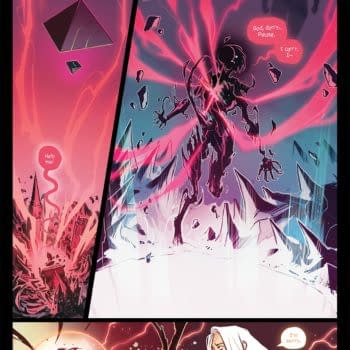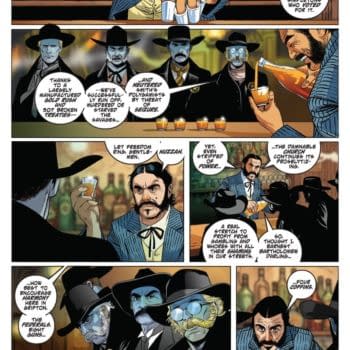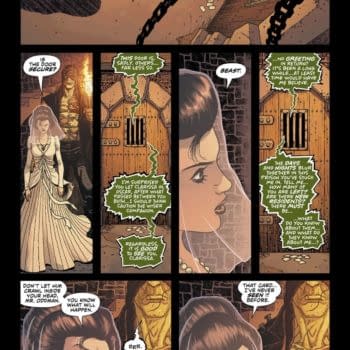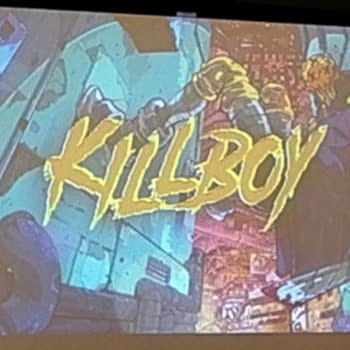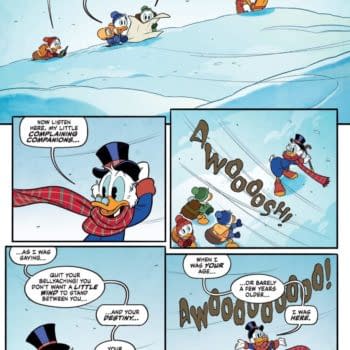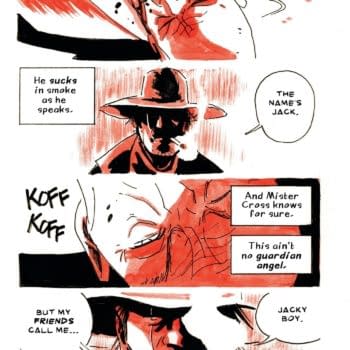Posted in: Comics | Tagged: Comics, entertainment, Eric Reynolds, fantagraphics, gary groth, Kristy Valenti, Paul Constant
ECCC '14: Kickstarter, Crumb, And Rob Liefeld: The Future of Fantagraphics?
By one of our West Coast corespondents Gavin Lees:

To answer that question, Fantagraphics' president, Gary Groth, was joined by associate publisher Eric Reynolds, and editor Kristy Valenti in a conversation moderated by The Stranger's Paul Constant.
They began by talking about Thompson's influence on the company. Not only did he help to establish Fantagraphics' aesthetic, and bring in a line of comics in European tradition that other publishers would have ignored, but he was also the company's chief translator and editor. When he died, he left thirteen books unfinished and, while many of these would never sell in great numbers, they were nonetheless an important stream of revenue that kept the company afloat. That's when Groth decided to turn to Kickstarter to fill that revenue gap and help keep the company afloat.
This was a controversial move for the company (not least because of Dan Nadel's infamous "Sell your boots" proclamation on the Fanta-owned tcj.com) but overall there was little internal resistance to the move. Reynolds admits that he took a while to wrap his head around the concept. He was concerned what people would think of the company, but recognized that Groth had a good handle on the campaign. Also vital to the success was publicist Jen Vaughn — a talented cartoonist in her own right — who had run her own Kickstarter previously.
While several Kickstarter campaigns have ended in disaster, with many backers having their rewards go unfulfilled, but Groth was happy to report that fulfillments are proceeding apace, with over a thousand items shipped already, and many orders of t-shirts and prints will be going out in the next month.
The campaign has been galvanizing force within the office, with many of the publisher's employees taking a personal role in providing rewards. As Valenti remarked, nearly everyone who works at the company is an amazing artist, from accountant Ted Jouflas to marketing manager Mike Baehr — with the exception of her and Groth, who threatened to challenge one another to a bad-art draw-off.
Constant shifted focus to the company's new projects. With Thompson's absence, the possibility of new translations, and more foreign cartoonists was always in question. Groth was not concerned about the unfinished projects, and said that all existing obligations would be fulfilled. Reynolds took the time to correct a possible misconception, which is that all the foreign books were "Kim" books — often these projects happened organically, with many people at the company finding exciting new work overseas.
Although Fantagraphics is known as one of the great archival reprinters (Drawn and Quarterly's Peggy Burns once quipped that Groth "prefers his cartoonists dead,") their upcoming season reveals some bold new voices in the comics world. Valenti commented that comics is such a small world that whenever anyone of stature arises, it is hard to ignore them, which is why artists like Simon Hanselmann, Eleanor Davis, and Lucy Knisley are now finding their home at the company. Although Knisley already had a publisher, she pitched her new projects to Fantagraphics, because of the speed at which they can move, which is more inkeeping with the modern, often ephemeral, content of her work.
That being said, one of the banner publications of this year will be their Zap Comics box-set. This will be a five-volume set, including a jewel box of giclee prints of all the covers. The pages have been scanned from the original negatives, so this will be the best that these comics have ever looked. Groth considers it a landmark in comics history, and the most important series ever published. Valenti quipped that her editorial interns are having their minds blown continually, and has to contextualize the work for them. These pages were produced during the era of the Comics Code, and were trying to break every taboo in American culture. It was a huge act of free speech.
One of Fantagraphics' best-selling titles this year has been Ed Piskor's Hip-Hop Family Tree — now on its third printing. In addition to another volume later in the year, Piskor's work will also be the focus of their Free Comic Book Day offering, with some all-new material. Then, in November, both volumes will be collected in a deluxe box set, with a special bonus comic that tells the story of when Spike Lee directed Rob Liefeld in a Levi's commercial — the epic crossing point of comics and hip-hop. It will all be drawn in the "Extreme" style of '90s Image — Groth says he is terrified to be releasing it.
Beyond that, the future of Fantagraphics seems bright. The company is playing a large part in Seattle's bid to become a UNESCO City of Literature, and they are still attracting a huge number of cartoonists to the city, whose aesthetic is being shaped — almost subliminally — by its influence.
Gavin Lees writes for Bleeding Cool Magazine and assorted other publications. He lives in Seattle.









